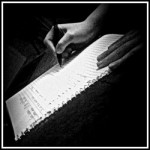Writing is a way of reclaiming my mind from depression, but there is a darker side to it called resistance. I won’t call it writer’s block because the same thing stands in the way of any purposeful activity or major life commitment, including the process of recovering from depression.
It usually begins only after I have resolved to stop avoiding what’s important in my life and go for it. Acceptance is a welcoming state of mind, but to complete a difficult work of any kind I need to add muscle to mindfulness.
The Resistance
Steven Pressfield writes in Do the Work about Resistance as the enemy you go to war with whenever you attempt a creative or original activity. Writing a story, starting a business or taking on any project that you want to do can bring with it a fear that prompts resistance to getting it done.
Pressfield isn’t writing about depression, but much of what he says about resistance applies quite well. As he puts it in The War of Art, the goal of resistance is to kill: “the target is the epicenter of our being – our soul, the unique and priceless gift we were put on earth to give …”
Resistance and Depression
Resistance to accomplishing anything that is important to you is a central aspect of depression itself. Resistance is about fear, delay, self-judgment and the expectation of failure.
It is the barrier between you and living well. It is a force that moves you away from a fulfilling life and toward the illusory relief of escape. It undermines your hopes and fulfills your disappointments.
Resistance is one of the tools of depression to take you out of life altogether, to take away the life force and turn it into a march toward dying. When depression has you completely, the resistance to living is so strong that the rush toward death feels like the fulfillment of your destiny.
You don’t encounter resistance until you try to get free of depression and to resume your life. You no longer want to avoid everything. You want to engage. You want to get better. This is the time resistance pushes you back to the line of scrimmage, the starting point of the clash between you and depression.
Writing Becomes the Block
The thing itself that you want to do or experience can be taken over by resistance. You find yourself stuck with a fake in clever disguise.
Writing is my daily example. When resistance is strong, the words can become a fog to get lost in. I find myself anxiously pouring out an unorganized mass of ideas and straying thoughts that obscure what I am aiming for, a finished piece. I am not blocked from writing. This cloud of interesting words, the writing itself, has become the block.
I am using the words and the gray tangle of lines to tie up the hidden feeling or completed thought or action. I let the anxiety and fear abuse the verbal flow – turn it toward self-defeat, inaction and paralysis.
Resistance is as protean and resourceful as your imagination. When you think you are fighting it, you may suddenly realize that it has taken you over. You are the one who stops trying to do what you had most wanted to do. You make the decision to stop and turn to something else. The reasons seem compelling. As Pressfield puts it, resistance works only in one direction – when you are moving toward your goal. If you go in the other direction, in retreat, the path is clear, and the wind is at your back instead of in your face.
Working with Resistance
How do I overcome resistance, whether to writing or recovery or getting a new job? That has become my trick question. I don’t overcome resistance so much as work with it. Resistance is like my sense of direction – infallibly wrong.
Without a clear map in my mind, I will always make the wrong turn, but I can trust my mistake. If I turn in the direction opposite to the one I think is correct, I will get where I want to go.
Resistance always makes the wrong way look so beautiful, or at least emotionally appealing in the moment. Here’s a great shortcut, or a fascinating and relevant diversion, the perfect place for a mental picnic. I’ve tried to make resistance my unwilling guide by turning away from the promised relief of not doing and looking toward the broken wall, the cactus field or other obstacle that looks and feels like stress, tension and fear – beyond which lies my goal.
Staying with Fear
Fear is the central experience, and working with resistance means sitting with fear for a while. The worse it gets, the more important I know it is to stay with it. I know that I’m close to finishing what I’m trying to do when the fear reaches the intensity of panic. I’m close to something that comes from deepest within me, and that is exactly what I am most afraid of.
In depression, I’m afraid to bring it out in the open because I have come to feel there’s something dangerous inside, something too powerful that needs to be kept under control. Or I’m afraid that once it’s out in the open, I’ll be exposed somehow, too vulnerable, too raw. The fear confuses everything, though the feeling itself seems sharply focused. The object of the fear gets fuzzy and vague. I can never quite name or visualize it. Staying with the fear is the only way I’ve learned to weaken its power.
As you can see, this isn’t about an isolated activity called writing that I like to do for self-expression. It’s about the way I have tried to free myself from the constrictions of depression.
Writing is a stand-in for many dimensions of life. It summons a voice from within that captures a whole being and rides the breath of life from the same deep source.
Whatever your equivalent of writing might be, it captures the uniqueness of you. This is exactly the lively quality that depression tries to bury. It’s not surprising that you can meet so much resistance when trying to live and act from this vital core.
What are the forms of resistance you encounter and how do you deal with them?





What a relief! This article made me realize that I wasn’t the only one having trouble finishing things. I feel like I’m wading through molasses most days. I can’t seem to get things done. I start something, but get distracted by something else and the effort doesn’t get done. It makes me crazy! It is the story of my life. Thanks for writing this. Never have heard of it before.
Absoulutly amazing how you have put into words my entire life up to this point.I need vision through the fog.I loose structure on a continued basis fighting constantly ,resulting in exhustion.Any ideas for recharging?
Thank You ,Dan
I have used writing as a tool to get to my emotions and confront the real reasons why I think things and do things. It helps me reason out the best responses to the depressing side of life. Lots of times I have found that I am suffering unnecessarily — writing spurs me to action. Action such as having a long talk with my mother about why a nursing home might be next, instead of just worrying about it and letting it keep me up at night. Action such as claiming my right to have control over my own decisions w/o addressing religious tenets, w/o addressing what my relatives think, w/o projecting my fears into the future. I write to force myself to think about things I would rather not think about. Things that affect my moods. I also write to release my thoughts. Once I have the words on paper, it frees me because I know I can go back and read about the problem, I don’t have to “store” it in my brain. Poetry is really one of my greatest efforts to deal with depression. I’m good at it, too, which is rewarding in itself. With poetry I’m not diagramming sentences in my mind or worrying about punctuation. In poetry it’s perfectly okay to coin new words, to use unusual and often very personal metaphors and analogies, to say shocking things. For me it is true freedom at its best. I love using words.
Donna…
Exactly! I journal…not expecting or even wanting anyone else to ever read what I write…but so the thoughts get out of my head. Once on paper I simply don’t have to think about them anymore for that moment. When the writing flows (when I allow it), when it is totally unscripted…that is when I see and allow myself to identify the emotions and therefore the causes of the emotions. My therapist gave me a couple lists of words describing emotions beyond the 3 that I would allow myslf to feel: happy, sad, depressed. When I am feeling the depression gaining ground I try to write it out…using the more descriptive word list and it is amazing what really comes to the surface. Sometimes I see the error of my thinking…and sometimes I see that my feelings are actually quite normal and valid given the situation. Either way…it helps me to make sense of things. Often the words aren’t there verbally but they are always ready to be put on paper.
John’s words, so eloquently written, as do the thoughtful comments of others, give me so much comfort to see that I am not alone with the thoughts in my head.
Hi, Donna –
As usual, you’ve opened up a lot of new ideas. It’s so encouraging to hear how writing can help you take action, resolve problems and get closer to who you are, rather than trying to shape your life by the rules you’ve grown up with. I think that last is one of the most powerful parts of any therapeutic process. Perhaps, you can share some of your poetry??
My best to you –
John
John, you say, ‘Resistance is one of the tools of depression to take you out of life altogether, to take away the life force and turn it into a march toward dying. When depression has you completely, the resistance to living is so strong that the rush toward death feels like the fulfillment of your destiny.’
Within your statement about resistance is the best description of depression I’ve seen. It’such a hard thing to describe but this sums it up. It really is an absence of life force and, for me, not so much a march towards dying (that would be too energetic and purposeful) as a slouch towards it.
Thank you.
Hi, Ann –
Thanks for this insight. I said “march” and “rush” because I was thinking of people who had taken their own lives. But, thank God, most of us do slouch and have the time and ability to do something before it’s too late.
John
John,
Another timely entry as this is exactly what I have been dealing with…and just when I thought I was getting beyond the depression. Some days I can summon up the inner strength to just “power through” whatever is blocking me, but lately, I’ve been exhausted at just the THOUGHT of moving forward. I rationalize, quite well, by saying that there have been too many other demands on my time and therefore I NEED to just “rest” for awhile…and then I’ll have the energy to complete (or start) the task at hand. Meanwhile, time continues to slip away and I am no closer to reaching any of the goals I set.
So…TODAY, instead of fighting (and losing) the battle, I am going to “go with the flow” of resistance by starting just ONE small thing on my list and hope that inertia takes over!
Thanks for the inspiration!
I can really relate to you on this one! I think that it’s important to note that everyone has trouble being motivated, in some way, at some point. Everyone experiences resistance.
I don’t know what kinds of goals and tasks you are talking about, but in my view, taking baby steps rather than trying to power through is a great way to reframe things. Sometimes we are so hard on ourselves for not doing ‘enough’: what is enough?
Best wishes,
Renee
Hi, Shel –
Good for you. That’s the only way anything gets done – start with one small part. Best of luck.
John
I remember first reading about resistance in ‘The Power of Now’ and other new agey self help books and articles so long ago. I felt like I understood and vowed to acknowledge that in my life. But how you relate it to writing and creativity here brings it to a whole new level. The way that you describe it here is something I can completely relate to. Reading your post just now made me realize that I am resisting a lot right now.
I think that my resistance manifests itself as boredom disguised as ‘relaxing,’ or maybe escapist activities: staying inside, being alone, watching movies, drinking beer with friends. I have ideas of things I’d love to do, or try, all the time…and never really follow through. Could be as simple as blogging, or making some cards out of photos, or going to a yoga class with a friend. It always ‘feels’ easier to just…not.
Hi, Renee –
It is always easier to ‘not’ – I’m thankful to Steve Pressfield for this basic insight that resistance goes one way, toward the things you value, and the relief of escape lies in the other direction. It would be nice if I could always be present enough with my intention in the now to let all the distracting possibilities float away, but I’m not. The idea of resistance is a mind-opener just now.
All my best to you —
John
I think for me it is a sense of hopelessness and futility – that despite doing my best it won’t make any difference.
How do I deal with it? Sometimes by finding where the messages that say this come from. Sometimes by doing the next small thing. Checking the reasoning and what I think is likely. Sometimes, if not a big thing, by distracting myself and then getting back to what I’m doing.